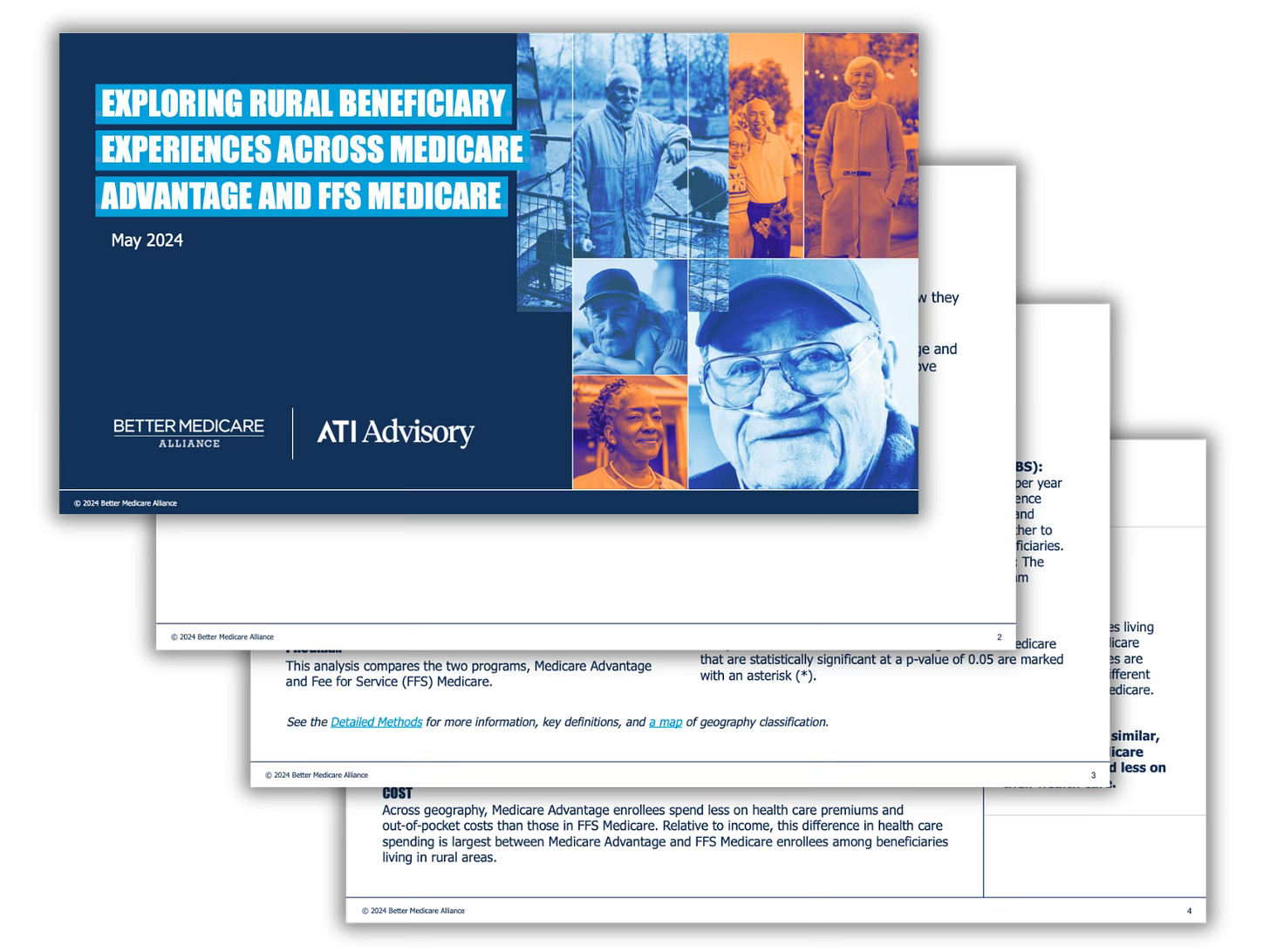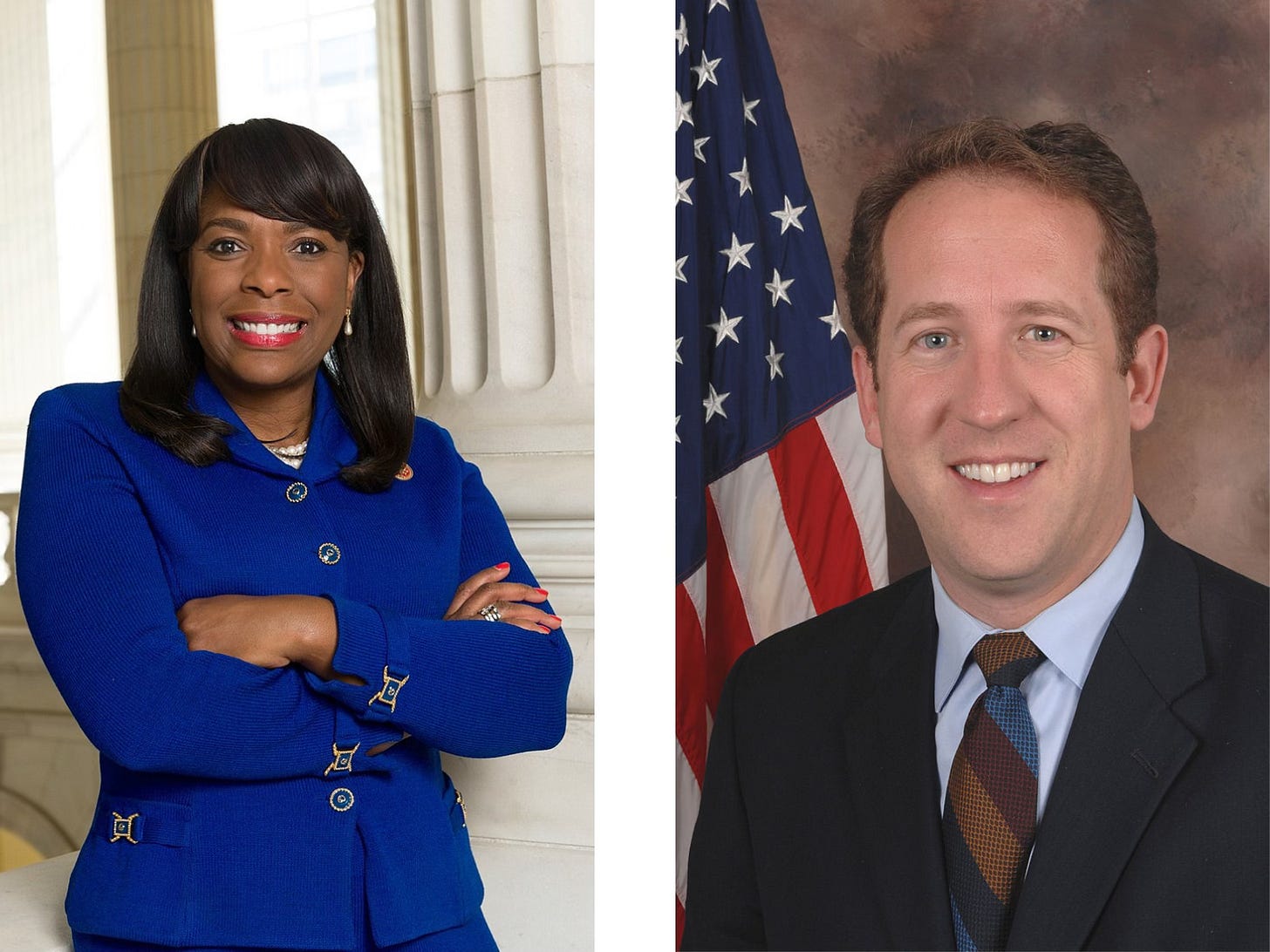While an Insurance Industry Front Group Pushes Against Medicare Advantage Scrutiny, Rural Hospitals Remain Unswayed
In early May, the Better Medicare Alliance, an active front group for the health insurance industry and perhaps the country’s greatest champion of Medicare Advantage plans, unveiled a new report. The alliance, with a well-stocked, industry-financed war chest to promote insurers’ premier product, claimed traditional Medicare beneficiaries living in rural areas spend 49% more on health care premiums and out-of-pocket costs than people enrolled in Medicare Advantage plans. Mary Beth Donahue, president and CEO of the alliance, announced that “seniors living in rural areas face unique health care challenges. Access and affordability should not be among them.”

The report noted that over the last six years, the average number of Medicare Advantage plans offered to Medicare beneficiaries in rural areas had tripled, and that this growth, combined with telehealth service, gave rural seniors “broader access to quality, affordable care.” Furthermore, the press release claimed, Advantage plan beneficiaries “are more likely to report satisfaction with the ease of getting to the doctor” and “are more likely to use key preventive services.”
To paint a veneer of authenticity on the report, there were quotes from U.S. Rep. Adrian Smith, a Republican from rural Nebraska, who said the “analysis provides valuable data on the positive outcomes, particularly greater utilization of preventive care and fewer outpatient visits, for rural Americans enrolled in Medicare Advantage.”
And U.S. Rep. Terri Sewell, a Democrat from Alabama, said the report’s findings “demonstrate progress in enhancing consumer choice and lowering costs for rural seniors.”
Sewell has something of a track record when it comes to pushing Advantage plans for the alliance. In 2020 she was named a “Medicare Advantage Breakthrough Champion,” an award that honored members of Congress who stood out in their efforts to strengthen Medicare Advantage. In 2022, she received the organization’s Medicare Champion Award, which recognizes lawmakers who have worked in a bipartisan fashion to strengthen and protect Medicare Advantage.

Was this latest study from the Better Medicare Alliance timed to deflect the growing pushback Medicare Advantage plans are encountering around the country, especially in rural areas where hospitals have dropped some or all of their Advantage plans?
There was evidence last fall that Medicare Advantage was under attack when several hospitals announced they were reviewing their arrangements with Advantage plan sellers and were not accepting some or all plans. The CEO of the Brookings Hospital system in Brookings, South Dakota, told me, “The difference between original Medicare and Medicare Advantage is vast. Advantage plans pay less, don’t follow medical policy, coverage, billing, and payment rules and procedures, and they are always trying to figure out how to deny payment for services.” Six months ago Becker’s Hospital Review reported that at least 16 hospitals, including the one in South Dakota, were dropping some or all of their contracts with Advantage plans.
Fast forward to now
Becker’s Hospital Review reported in March that a recent survey of 135 health system CFOs indicated that 16% of those systems were planning to stop accepting one or more Advantage plans in the next two years, and 45% said they are considering doing so. Nineteen percent stopped accepting one or more plans last year.
Last October the Nebraska Hospital Association issued a damning report on the experience of the state’s hospitals with Advantage plans. It reveals a disturbing picture of those plans that anyone newly eligible for Medicare should know. The report revealed that 90% of the state’s hospitals said Advantage plans negatively impacted care that those hospitals could give; more than 92% of the hospitals reported that prior authorization requirements imposed by Advantage plans delayed necessary care; and 87% said it was more difficult to get placements for patients who need medical care after hospital discharge.
The association reported nursing homes in the area were less likely to accept patients with Advantage plans than those who have traditional Medicare and a supplement policy because of the lower payment rates they receive. The hospital association reported that Advantage patients often must pay for care themselves because they can’t go home or find a nursing home willing to take them.
Those findings strongly suggest that prospective Medicare beneficiaries might want to stay in traditional Medicare and buy a Medicare supplement (Medigap) policy – if they can even qualify for one. Warning: Except for those living in New York, Maine, Massachusetts and Connecticut, Medicare beneficiaries who want to ditch their Advantage plans for traditional Medicare and a Medigap policy will have to undergo a health examination from the Medigap insurance company that checks for health conditions they don’t want to insure. People who don’t pass what’s called “underwriting” are stuck.
Another damning report, this one issued by the Nebraska Rural Health Association, also revealed the pitfalls of joining an Advantage plan. The report warned that Nebraskans with Advantage plans “have created such a financial burden for rural residents” that when they get sick, those with Medicare Advantage coverage “represent the largest growing segment of charity care for Nebraska’s rural hospitals.” I’d bet few if any seniors are told they may end up on charity care if they choose an Advantage plan. That possibility should be reason enough to avoid those plans.
The report also points out that an Advantage health plan may exclude the doctors in a beneficiary’s community, making it necessary for seniors to drive to neighboring towns for medical services. And if their plan doesn’t provide coverage outside their community, they can face financial risk when they go on a trip out of their area to visit grandchildren. Again, I doubt these drawbacks come up in sales pitches.
In May, Great Plains Health, a hospital in North Platte, a town of some 23,000 in the middle of Nebraska, announced it would no longer accept Medicare Advantage plans. Great Plains Health CEO Ivan Mitchell told me his hospital has experienced delays in transferring patients to nursing homes and other health care facilities because of difficulties getting the required preauthorizations from Medicare Advantage companies. “There are times when patients are denied post-acute care, and they are just here waiting to see what the next step is.”
In the meantime, Mitchell said, the facility needs the beds for people who do need to be hospitalized. “They deny transfers 13% of the time, and that makes billing and follow-up more complex,” he said. “They stay in the hospital two to three days more than they need to, and we’re turning away patients who need to be there. The stay is 40% longer than it needs to be waiting while the insurance company makes up its mind.”
Mitchell was direct: “There’s a lot of pressure at the national level to make the health plans follow guidelines. Right now we don’t think it (Medicare Advantage) is good for patients. We have no plans to go back.”
The warnings from the Cornhusker state could not be clearer for consumers new to Medicare who value superior insurance that pays the medical bills instead of the Medicare Advantage enticements of grocery items and toothpaste. There’s no reason to believe rural or urban Medicare beneficiaries who have chosen Medicare Advantage have different experiences than those in Nebraska.
The problems plaguing Medicare Advantage go back to the early days of Medicare when seniors had to buy supplemental insurance if they wanted to fill in the coverage gaps the 1965 law created. Those supplements were sold using deceptive tactics untilCongress put an end to those practices in 1990, mandating standardized plans for Medigap insurance. It could do the same now for Advantage plans. David Lipschutz, co-director of the Center for Medicare Advocacy, says, “Congress is reluctant to standardize benefits fearing that would stifle innovation. In fact, there is little innovation to show for the excessive payments the plans receive.”
There is enough evidence now to know that Advantage plans delay and deny care, sometimes putting their patients in medical jeopardy. As we approach another Medicare open enrollment season, it’s wise to remember that old admonition consumer reporters used to give: Caveat Emptor — “Let the buyer beware.”






I’m a discharge planner for a hospital. I’ve been working all day trying to find a home health company to service a patient who lives in rural WA. His UHC Managed Medicare has no service contracts where he lives. If he had original Medicare, this wouldn’t be a problem. Instead, he sits here in the hospital waiting while we try to figure out what to do. It’s unconscionable.
Congress should disallow the use of Medicare in Medicare Advantage. It is nothing like Medicare and it is woefully deceptive to imply that it is an advantage.